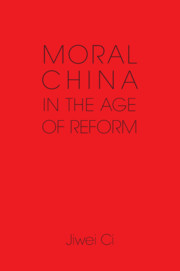Book contents
- Frontmatter
- Dedication
- Contents
- Acknowledgments
- Introduction
- 1 An Anatomy of the Moral Crisis
- 2 Political Order, Moral Disorder
- 3 Freedom as a Chinese Question
- 4 Freedom and Its Epistemological Conditions
- 5 Freedom and Identification
- 6 Neither Devotion Nor Introjection
- 7 The Insult of Poverty
- 8 Democracy as Unmistakable Reality and Uncertain Prospect
- 9 Freedom’s Unfinished Task
- 10 China’s Space of Moral Possibilities
- Index
- References
10 - China’s Space of Moral Possibilities
Published online by Cambridge University Press: 05 September 2014
- Frontmatter
- Dedication
- Contents
- Acknowledgments
- Introduction
- 1 An Anatomy of the Moral Crisis
- 2 Political Order, Moral Disorder
- 3 Freedom as a Chinese Question
- 4 Freedom and Its Epistemological Conditions
- 5 Freedom and Identification
- 6 Neither Devotion Nor Introjection
- 7 The Insult of Poverty
- 8 Democracy as Unmistakable Reality and Uncertain Prospect
- 9 Freedom’s Unfinished Task
- 10 China’s Space of Moral Possibilities
- Index
- References
Summary
1
This book could with good reason have ended with the last chapter. In that briefest of chapters I argued for approaching freedom in the spirit of a question, especially regarding its relation to the good, after having tried to show, in previous chapters, why freedom must be an important part of any solution to China’s moral crisis and, by implication, to many of its other problems. But I cannot quite resist the temptation, in this afterthought of a chapter, to make a modest beginning in taking up the question of freedom beyond arguing for its necessity. This is a rather different undertaking from what has been pursued in all the previous chapters and, for this reason, the attempt must be judged somewhat independently. While this final chapter obviously presupposes and builds on the main steps of argument in the previous chapters, it should not be deemed to weaken any of the latter if the further, tentative steps it takes do not constitute good enough answers to questions raised in the earlier. In this spirit, then, I shall pursue an idea about freedom that I should like to think is both definite and appropriately open, and I shall do so by taking some care to situate the question of freedom within the space of broader moral and political possibilities in the foreseeable future of China.
But I must first take a long detour devoted to reflections first on human nature and then on modernity. I see no better way to give a glimpse of the need for this detour than with reference to Marx’s cautionary methodological remarks directed at Jeremy Bentham, although utilitarianism is otherwise of no concern for my purposes.
To know what is useful for a dog, one must investigate the nature of dogs. This nature is not itself deducible from the principle of utility. Applying this to man, he that would judge all human acts, movements, relations, etc. according to the principle of utility would first have to deal with human nature in general, and then with human nature as historically modified in each epoch. Bentham does not trouble himself with this. With the driest naїveté he assumes that the modern petty bourgeois, especially the English petty bourgeois, is the normal man.
- Type
- Chapter
- Information
- Moral China in the Age of Reform , pp. 187 - 224Publisher: Cambridge University PressPrint publication year: 2014



